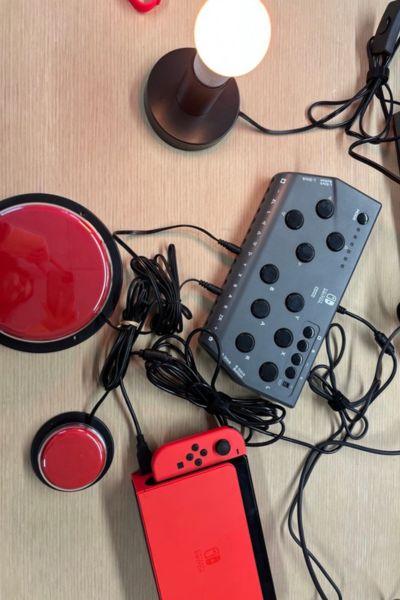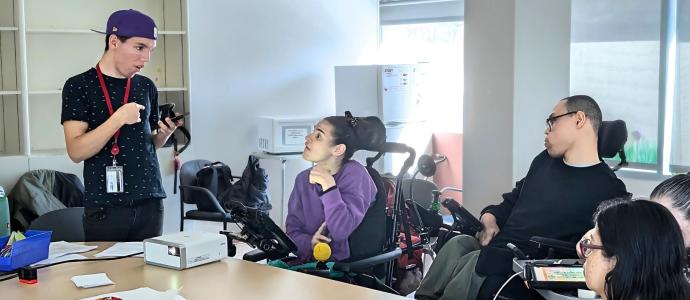Share
As a teenager, Tobias Weinberg faced the unimaginable — losing his ability to speak and with it, the ease of expressing humor, a vital part of human connection. At just 15, a neurological condition took his speech, forcing him to find new ways to communicate and connect with the world around him.
“It was a wild experience seeing my whole world changing in just one month when the neuro-motor disease manifested, suddenly I couldn’t speak or move normally," said the 28-year-old. “Humor is the lens through which I see the world. When I lost the ability to speak, I had to learn to adapt my humor to this new form of communication without losing my touch."
Now a Pi-Tech Fellow at Cornell Tech and an intern at YAI’s Center for Innovation and Engagement, Weinberg is dedicated to transforming communication for the more than two million Americans who rely on Augmentative and Alternative Communication (AAC) devices.
His latest project, Why So Serious? Exploring Humor in AAC Through AI-Powered Interfaces, is a research prototype aimed at helping AAC users infuse wit and personality into real-time conversations. The app addresses a critical gap—empowering users to express humor, strengthen social connections, and challenge misconceptions about disability.
“As an AAC user types a joke, the conversation moves on,” Weinberg explained using his AAC device, his iPhone. “By the time it plays, it's too late. My project explores AI-powered tools to speed up responses while preserving user agency.”

Beyond the app, Weinberg is driving innovation in AAC technology, making communication more expressive and natural. He leads co-design workshops at YAI, bringing together AAC users, speech pathologists, and researchers to improve conversational engagement.
YAI’s partnership with Cornell, launched in 2019, has provided opportunities for doctoral students like Weinberg to explore the technology and accessibility needs of people with intellectual and developmental disabilities (I/DD). The initiative has driven technological advancements aimed at increasing inclusion.
“We collaborate with fellows as they develop innovative solutions to support people with I/DD, aiming to drive future product development,” said Judith Bailey-Hung, BIS Coordinator and Supervisor of the Center of Engagement and Innovation at YAI. “Their expertise has been invaluable in providing fresh perspectives and ideas.”
In addition to his AAC project, Weinberg is developing a system to collect data from sensors and smart home technology in YAI residences to enhance accessibility. Past fellows have contributed to projects such as seizure monitoring technology and AR/VR headsets designed to help people with I/DD during dental visits by easing sensory stress.
Despite advances in assistive technology, research highlights a significant digital divide, emphasizing the need to expand access and training for both people with I/DD and caregivers. By equipping them with the necessary skills and support, technology can enhance communication, independence, and overall quality of life.
A study in The Disability and Health Journal found that fewer than half (44.6%) of 370 surveyed people with I/DD at a New York healthcare facility used devices like tablets, smartphones, or desktops. The vast majority (86.8%) did not engage with social media, and only 21.6% reported using assistive technology, underscoring digital accessibility gaps.
To bridge this gap, YAI’s Center for Innovation and Engagement launched the Tech Lab last summer. This hands-on space allows individuals to explore and test assistive technology before committing to a device, much like a lending library. The goal is to empower people with I/DD to find tools that best suit their needs and improve their daily lives.
“It doesn’t have to be fancy or overly big,” said Sarah Shanderson, a Person-Centered Technology Specialist. “As long as it makes them happy and provides support, then it’s doing its job.”
The Tech Lab features a variety of assistive technology designed to enhance accessibility and independence. Current innovations include Meta Ray-Ban glasses that help people with low vision identify objects, and a 3D printer—set up with Weinberg's assistance—which creates custom assistive tools such as larger keys for easier gripping, pill poppers, and soda can openers. Other available technology includes motion and door sensors, adaptive gaming systems like the Nintendo Switch, smart lighting, and Raspberry Pi for data collection and automation.
“Technology has the potential to transform the lives of millions of people with disabilities—but it’s up to us to make that transformation a reality," said Weinberg.

